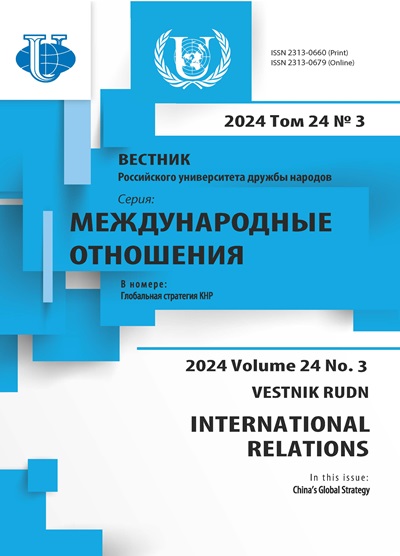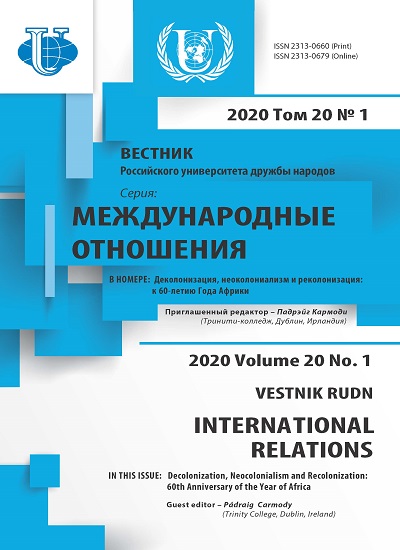Холодная война и политическая культура Африки
- Авторы: Калу К.1
-
Учреждения:
- Школа менеджмента Теда Роджерса, Университет Райерсон
- Выпуск: Том 20, № 1 (2020): Деколонизация, неоколониализм и реколонизация: к 60-летию Года Африки
- Страницы: 11-21
- Раздел: ТЕМАТИЧЕСКОЕ ДОСЬЕ
- URL: https://journals.rudn.ru/international-relations/article/view/23319
- DOI: https://doi.org/10.22363/2313-0660-2020-20-1-11-21
Цитировать
Полный текст
Аннотация
Лидерство и политические системы в большинстве стран Африки описываются, как правило, в негативном ключе. Патернализм, клиентелизм, диктатура, коррупция и подобные уничижительные ярлыки используются для описания политических практик, получивших распространение в большинстве стран Африки сегодня. В ряде исследований политические проблемы Африки объясняются в контексте выбора постколониальных африканских лидеров. Другие исследователи указывают на европейскую колониальную эксплуатацию и ее разрушительное наследие как основы порочной политической культуры, определяющей современную Африку. Хотя эти факторы играют важную роль в определении типа политики, которая проводилась на континенте в течение последних 60 лет, в данной статье рассматривается еще одна эпоха, которая оказала значительное влияние на политическую культуру современной Африки. В статье показано, что внешняя политика Соединенных Штатов и СССР - двух основных действующих лиц в Африке во время холодной войны - также оказала значительное влияние на политическую культуру, сложившуюся в постколониальной Африке. Стремясь к идеологическому превосходству, эти внешние акторы сосредоточились на том, чтобы подрывать влияние друг друга, и мало думали о том, как их действия в Африке формируют политическое развитие континента. Предоставляя военную поддержку противостоящим силам в африканских странах, участники холодной войны институционализировали насильственную политическую культуру в постколониальной Африке.
Ключевые слова
Об авторах
Кеннет Калу
Школа менеджмента Теда Роджерса, Университет Райерсон
Email: kenneth.kalu@ryerson.ca
доктор философии, доцент, департамент глобального менеджмента Торонто, Канада
Список литературы
- Acemoglu, D. & Robinson, J. (2010). Why is Africa Poor. Economic History of Developing Regions, 25 (1), 21-50. doi: 10.1080/20780389.2010.505010
- Acemoglu, D., Johnson, S. & Robinson, J. (2001). The Colonial Origins of Comparative Development: An Empirical Investigation. The American Economic Review, 91 (5), 1369-1401.
- Adebanwi, W. & Obadare, E. (2013). Democracy and Prebendalism in Nigeria: Critical Perspectives. New York: Palgrave Macmillan.
- Almond, G.A. & Verba, S. (1963/1965). The Civic Culture - Political Attitudes and Democracy in Five Nations. Boston and Toronto: Little, Brown and Company.
- Barka, H.B. & Ncube, M. (2012). Political Fragility in Africa: Are Military Coup d’états a Never Ending Phenomena? AfDB Chief Economist Complex, September.
- Chakrabarty, D. (2000). Provincialising Europe: Postcolonial Thought and Historical Difference. Princeton: Princeton University Press.
- Connelly, M. (2000). Taking Off the Cold War Lens: Visions of North - South Conflict during the Algerian War for Independence. The American Historical Review, 105 (3), 739-769. doi: 10.2307/2651808
- Denk, T., Christensen, H.S. & Bergh, D. (2015). The Composition of Political Culture-A Study of 25 European Democracies. Studies in Comparative International Development, 50 (3), 358-377. doi: 10.1007/s12116-015-9174-6.
- Falola, T. (2016). Nigerian Political Modernity and Postcolonial Predicaments. Austin: Pan-African University Press.
- Grandin, G. (2004). The Last Colonial Massacre: Latin America in the Cold War. Chicago: University of Chicago Press.
- Inikori, J.E. (2000). Africa and the Trans-Atlantic Slave Trade. In: Falola, T. (Eds.). Africa. Vol. 1: African History Before 1885. Durham: Carolina Academic Press. P. 389-412.
- Kalu, K. (2017). State-Society Relations, Institutional Transformation and Economic Development in Sub-Saharan Africa. Development Policy Review, 35 (S2), O234-O245. https://doi.org/10.1111/dpr.12320.
- Kalu, K. (2018). Africa and the Cold War. In: Shanguhyia, M.S. & Falola, T. (Eds.). The Palgrave Handbook of African Colonial and Postcolonial History. New York: Palgrave Macmillan. P. 661-680.
- Kalu, K., Yacob-Haliso, O. & Falola, T. (Eds.). (2018). Africa’s Big Men: Predatory State-Society Relations in Africa. New York: Routledge.
- Lovejoy, P.E. (2000). Transformation in Slavery: A History in Slavery in Africa (2nd Edition). New York: Cambridge University Press.
- Manning, P. (1990). Slavery and African Life: Occidental, Oriental and African Slave Trades. Cambridge: Cambridge University Press.
- McCormick, T. (1995). America’s Half Century: United States Foreign Policy in the Cold War and after. Baltimore: John Hopkins University Press.
- O’Sullivan, C. (2005). The United Nations, Decolonization, and Self-Determination in Cold War Sub-Saharan Africa, 1960-1994. Journal of Third World Studies, 12 (2), 103-120.
- Osaghae, E. (2006). Ethnicity and the State in Africa. Kyoto, Japan: Afrasian Center for Peace and Development Studies.
- Reid, R.J. (2012). A History of Modern Africa: 1800 to the Present. West Sussex: John Wiley & Sons Ltd.
- Rodney, W. (1981). How Europe Underdeveloped Africa. Washington: Howard University Press.
- Schmidt, E. (2013). Foreign Interventions in Africa: from the Cold War to the War on Terror. Cambridge: Cambridge University Press.
- Suri, J. (2006). The Cold War, Decolonization, and Global Social Awakenings: Historical Intersections. Cold War History, 6 (3), 353-363. doi: 10.1080/14682740600795519
- Van der Walle, N. (2003). Presidentialism and Clientelism in Africa’s Emerging Party Systems. Journal of Modern African Studies, 42 (2), 297-321. doi: 10.1017/S0022278X03004269
- Wallechinsky, D. (2006). Tyrants: the World's 20 Worst Living Dictators. New York: Harper Collins Publishers.
- Westad, O. (2007). The Global Cold War. Cambridge: Cambridge University Press.
- Yasmin, L. (2019). Development of International Relations at the Periphery: The Case of Bangladesh. Vestnik RUDN. International Relations, 19 (2), 247-255. doi: 10.22363/2313-0660-2019-19-2-247-255
- Young, C. (1994). The African Colonial State in Comparative Perspective. New Haven: Yale University Press.











